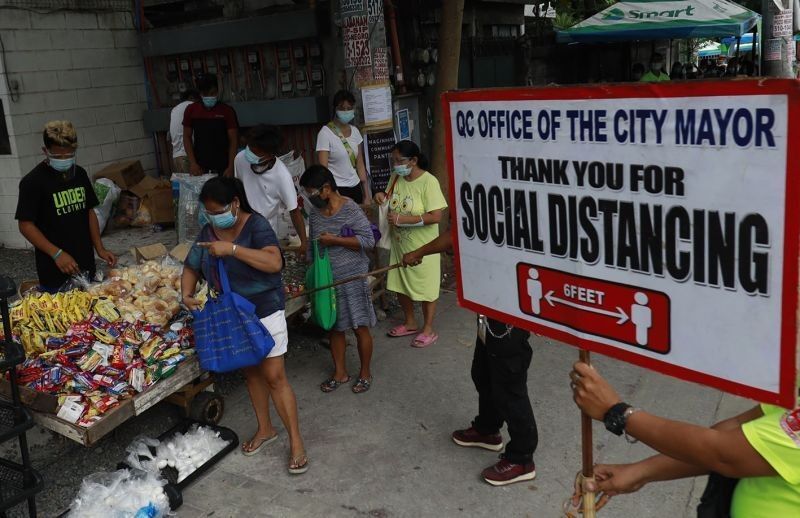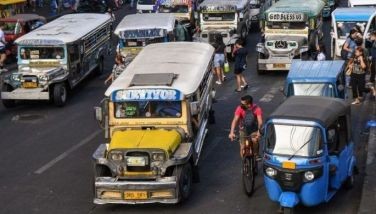What to do if law enforcers visit your community pantry? Diokno offers tips

MANILA, Philippines — The Maginhawa Community Pantry, the first that inspired hundred of other food banks across the country, resumed its operations on Wednesday after a day of temporarily closing down — due to red-tagging and fear for volunteers' safety.
An ABS-CBN tweet report on Wednesday said Ana Patricia Non shared that police has been asking for her number, which she gave to them since it is also accessible online. But she also learned from other volunteers that police had been asking for her address, and even if she is in a relationship.
Other organizers also reported similar harassment. Ia Marañon, organizer of the community pantry in Barangay Loyola Heights also in Quezon City, told Philstar.com that cops in combat fatigues approached them and asked for information on the organizers and their affiliations.
If law enforcers approach community pantries and their organizers, veteran rights lawyer Chel Diokno offers the following tips:
What if they want our personal information?
In a tweet thread, Diokno said that if law enforcers approach community pantry organizers and they are in uniform, they should ask for their names. If they are in civilian attire, they can ask them politely for a government ID and to write their names and affiliations, such as if they are from the Philippine National Police, Armed Forces of the Philippines or the National Bureau of Investigation.
“If they refuse, politely say that you can’t accommodate them because you are unsure if they are really law enforcers,” Diokno added.
If they are asked to fill out a form asking name, age, address, contact number and even Facebook account name, Diokno stressed that they are in no obligation to give their personal information. Privacy Commissioner Raymund Liboro and Justice Secretary Menardo Guevarra also said as such.
What if they want to enter, conduct a search?
“If the community pantry is in a private property, law enforcers cannot enter [premises] without a search warrant unless the owner allows it,” Diokno also said.
They can ask for a search warrant issued by a court judge, but if they cannot present such document, the lawyer says they can refuse to allow them entry.
3. If the community pantry is in private property, di pwede pumasok ang law enforcers kung walang search warrant, unless pumayag ang may-ari. Ask for a warrant signed by a judge; kung wala, sabihin: “Pasensya na po, pero di kayo pwedeng pumasok kung wala kayong search warrant."
— Chel Diokno (@ChelDiokno) April 21, 2021
“If the police insist, or imply that you are hiding something (If you are not hiding something, why don’t you let us in?), assert your right. Tell them: ‘That is my right and that is the lawyer’s advice to me',” he added.
If the community pantry is in public land, police do not need a search warrant to enter, but the rights lawyer stressed that “they still need a search warrant to search the community pantry or any other private property that is on public land,” he added.
Diokno also advised organizers to make sure that the community pantry, if on public land, does not obstruct traffic or they are not littering as this would constitute a violation of local regulations.
Do we need permits?
The lawyer said they may also be asked for a business permit, also known as a mayor’s permit. Organizers can answer them that in their understanding, they do not need any permit since the community pantry is not a business and was put up solely to help the needy.
If they would be asked to present a permit from the barangay, they can point out that the Department of the Interior and Local Government and the Anti-Red Tape Authority said in separate statements that a barangay permit is not needed.
Should they be asked to show an authority to solicit from the Department of Social Welfare and Development, they can reply that based on their understanding, this is only required for regional and national fund campaigns, and not for community pantries, Diokno also said.
READ: Permit or not? Mixed messages as gov't unsure how to address community pantries
What if they tell us we violate IATF guidelines?
Diokno explained that regulations issued by the Inter-Agency Task Force are merely recommendatory and “do not have the force of law unless they are adopted by the [local government unit] as a local ordinance.”
But he pointed out that even under IATF guidelines, humanitarian activities are allowed even if the locality is under enhanced community quarantine status or MECQ.
“Since a permit is not required to operate a community pantry, and the poor and urgently in need of food, a community pantry is an authorized humanitarian activity,” the rights lawyer said.
“Community pantries do not violate the IATF guidelines on humanitarian activities since no permit or license is required for them to operate,” he added.
What if they demolish our community pantry?
Do not physically resist.
If law enforcers try to dismantle the community pantry, Diokno said they can “politely and firmly object” but they should not resist physically.
They can also take videos or photos to document what they are doing, he added.
The lawyer explained that they do not need their consent if they will take videos. “The Anti-Wiretapping Act requires the consent of the parties if it is a private conversation or communication,” he added.
If law enforcers arrest them or search other volunteers or the community pantry, Diokno referred them to this primer made by the Free Legal Assistance Group, Philippine Center for Investigative Journalism and the Foundation for Media Alternatives.
What if they ask me to sign a document or acknowledgment form?
Organizers should read thoroughly whatever document, such an acknowledgment that they were visited, they can be asked to sign. They can also say that they need to consult with a lawyer before they sign.
Diokno warned that the document “may contain a waiver of rights and this can prejudice your right to file a case if necessary.”
RELATED: Beyond questions on lockdown, a dire need for legal assistance and rights education
He also advised them to take a photo of the document and forward it to a lawyer.
If the police insist, Diokno said they can use their non-dominant hand (if they write with their right hand, use left for signing, and vice versa) or use a different signature than the usual. “So you can later explain that you were forced to sign,” he added.
Diokno said if they can, set up CCTV cameras in their community pantry and ensure that it records 24/7.
The rights lawyer ended his thread with an expression of gratitude to all those who help and contribute to community pantries.
“I wish this can help you. You can also reach out to our FREE LEGAL HELPDESK anytime, you can just message us,” he added.
- Latest
- Trending

































